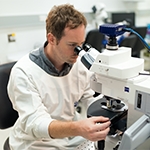Queensland Brain Institute (QBI)
The University of Queensland
The Queensland Brain Institute is one of Australia’s pre-eminent neuroscience research institutions with numerous ground-breaking discoveries and over 1,500 research papers published since the Institute’s establishment in 2003. More than 450 staff and students are working to understand how the brain regulates learning, memory and decision-making in order to better treat neurological and mental illnesses.
QBI research focuses on preventing and treating Alzheimer's and other dementias; investigating the genetic basis for diseases including anxiety, depression, schizophrenia and motor neuron disease; using deep brain stimulation to treat Parkinson's disease, Tourette syndrome, and obsessive-compulsive disorder; and understanding the science of learning to improve educational outcomes and prevent cognitive decline.
- Website
- http://www.qbi.uq.edu.au
- Organisation type
- University Research Centre
- Number of research staff
- 300-500 research staff
- Address
- Building 79, The University of Queensland, St Lucia QLD 4072
Strengths and capabilities
- Neurological disorders
- Deep brain stimulation
- Drug discovery
- Understanding neural circuits
- Genomics
- Biophysics of neurons
- High|field microscopy
- Functional magnetic resonance imaging (fMRI) and MRI imaging
- Single|cell imaging
- Animal behaviour
Facilities and major equipment
- Physical Containment Class 2 (PC2) laboratories
- Histology facilities
- Tissue culture facilities
- Flow cytometry facility
- Magnetic resonance imaging scanners
- Vivarium and animal behaviour facility
- Histochemistry laboratory
- Super-resolution microscopy facilities
- All-weather bee flight facility
- Electrophysiology rigs
Lead researchers
- Professor Pankaj Sah—Deepening understanding of synaptic plasticity in the amygdala, an area of the brain involved in emotional processing
- Professor Peter Visscher—Pioneering work in understanding the genetic differences between people with traits that are important for health outcomes and ageing.
- Professor Jürgen Götz—Discovery that non-invasive ultrasound therapy can be used to restore memory in a mouse model of Alzheimer's disease
Achievements of the centre
- Discovery that non-invasive ultrasound therapy can be used to reduce amyloid plaques and restore memory in a mouse model of Alzheimer's disease
- Soon to enter clinical trials is a discovery that specific exercise regimes can increase the production of new neurons in the hippocampus, resulting in improved learning, which has implications for reversing cognitive decline in the elderly
- Discovery of dozens of new sites across the human genome strongly associated with a genetic predisposition to schizophrenia.
Key science sectors
More information about the sectors this centre is involved in:
Update details
Is this your centre? See any issues? Send a request to update your listing.
